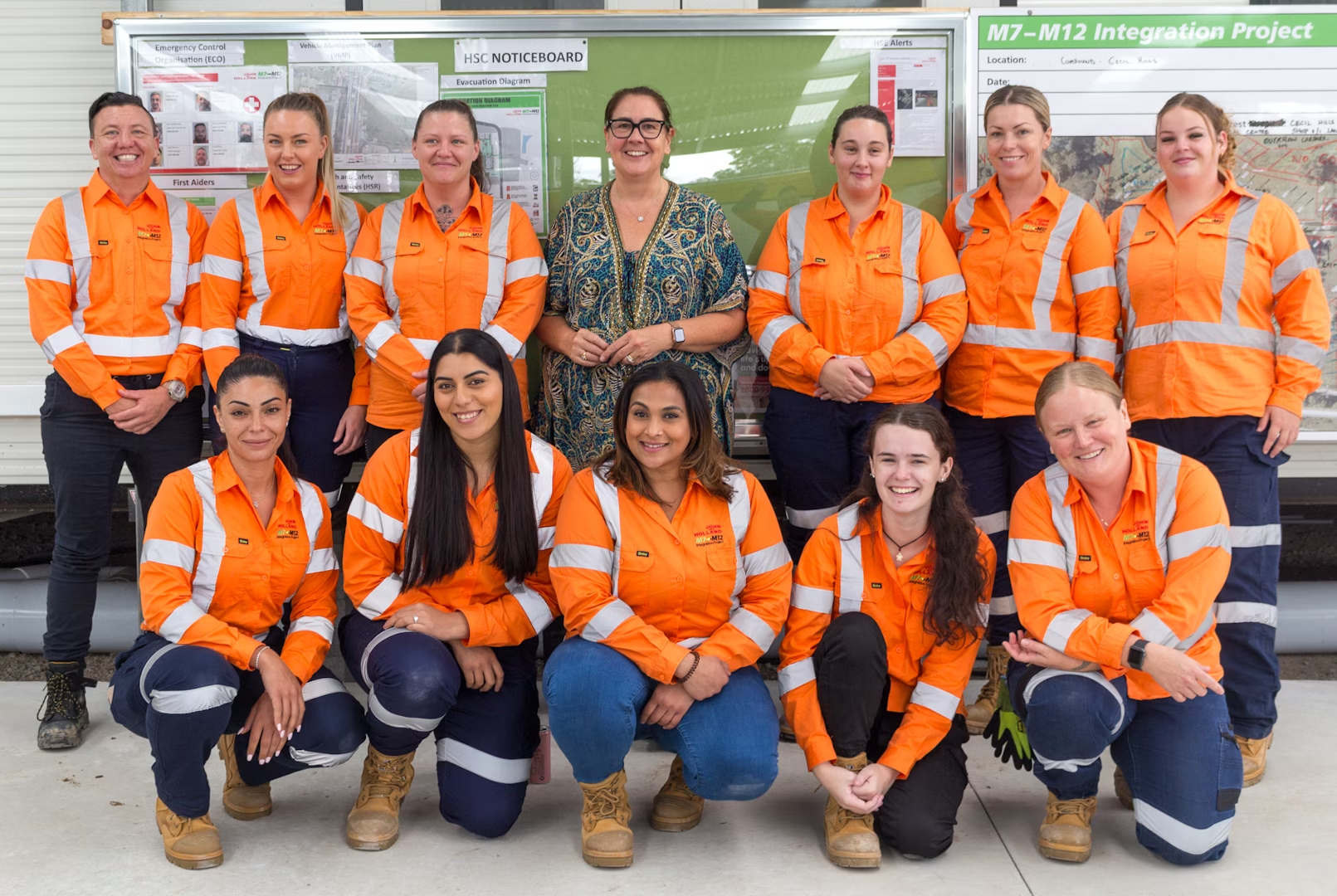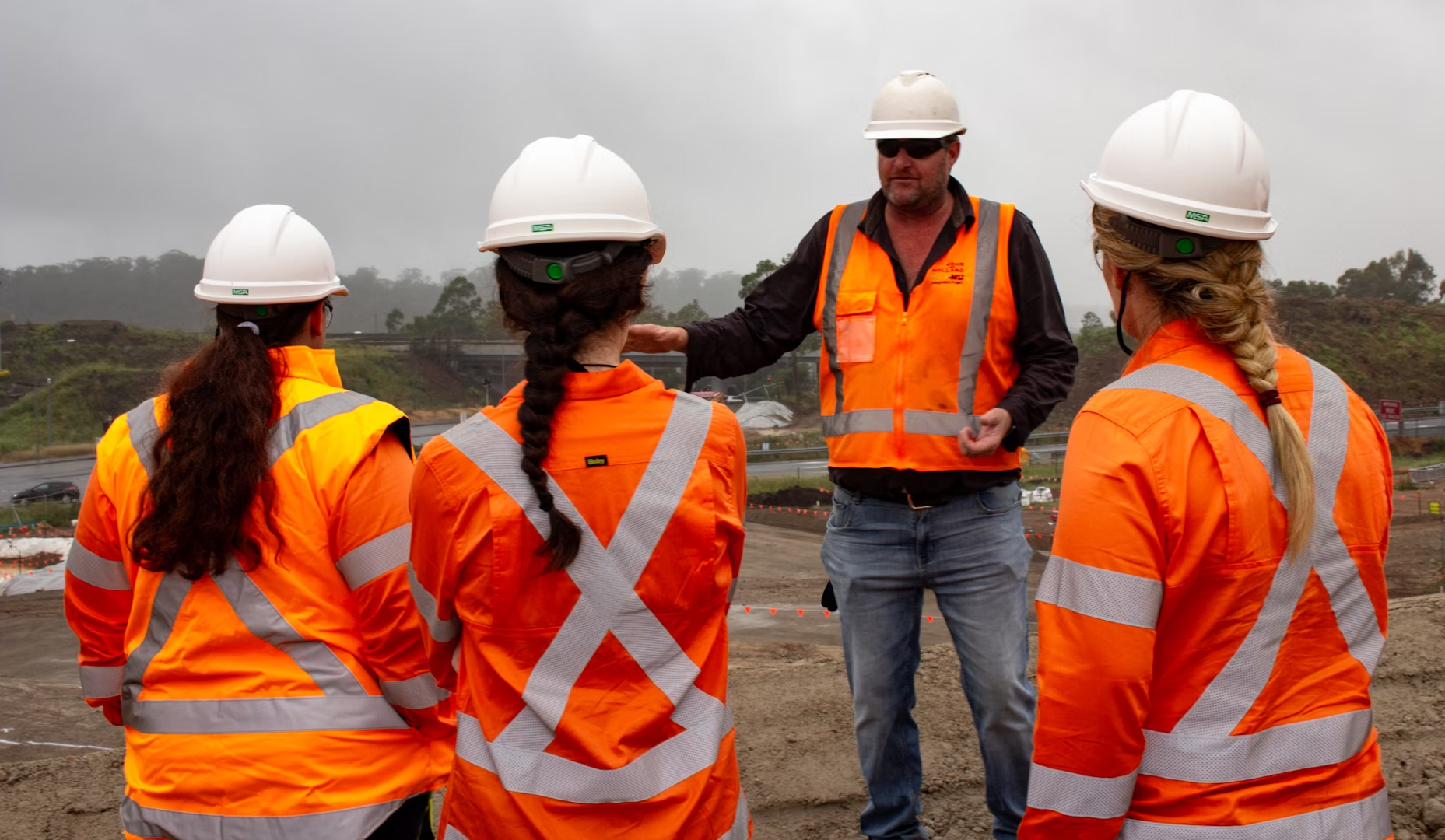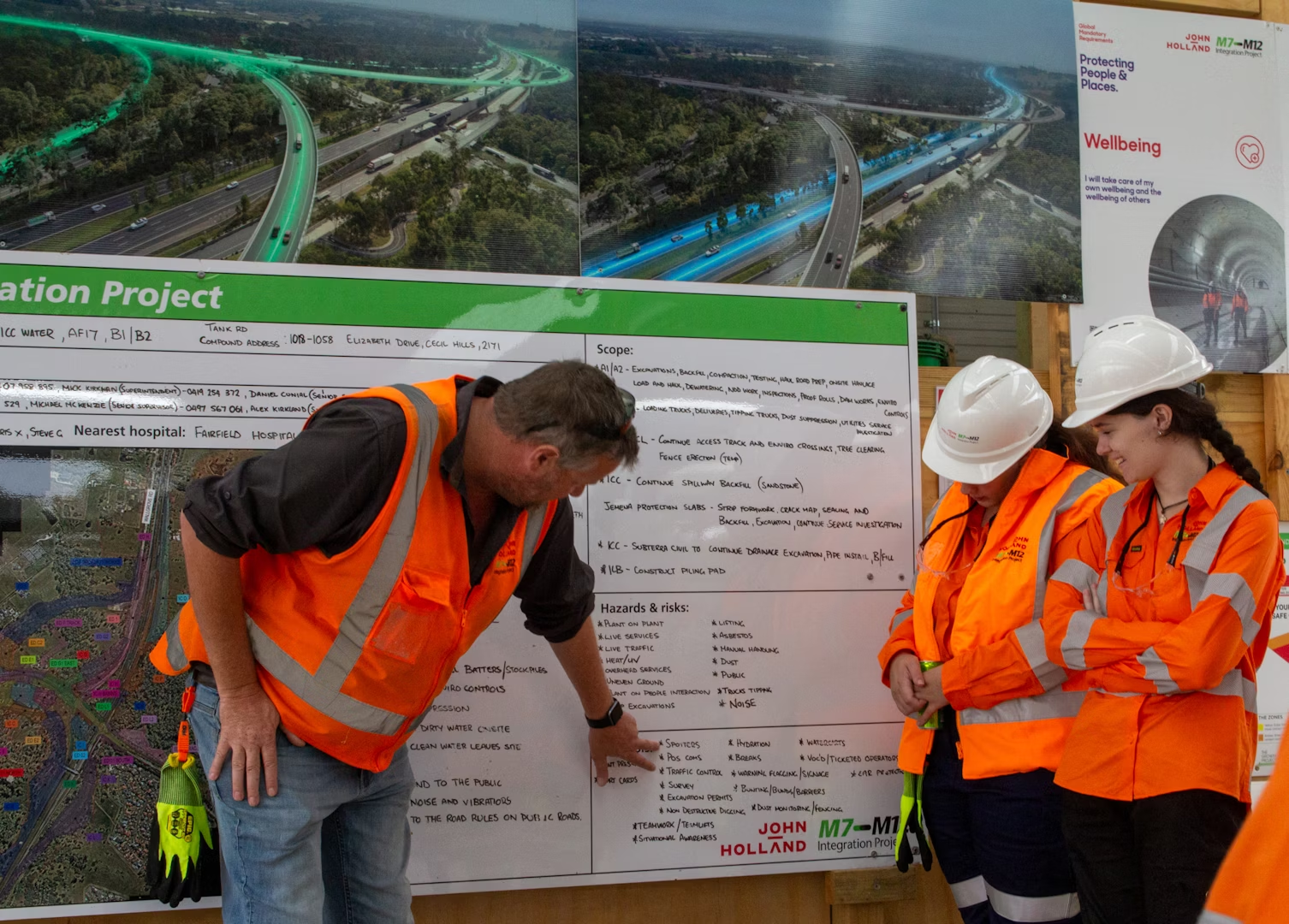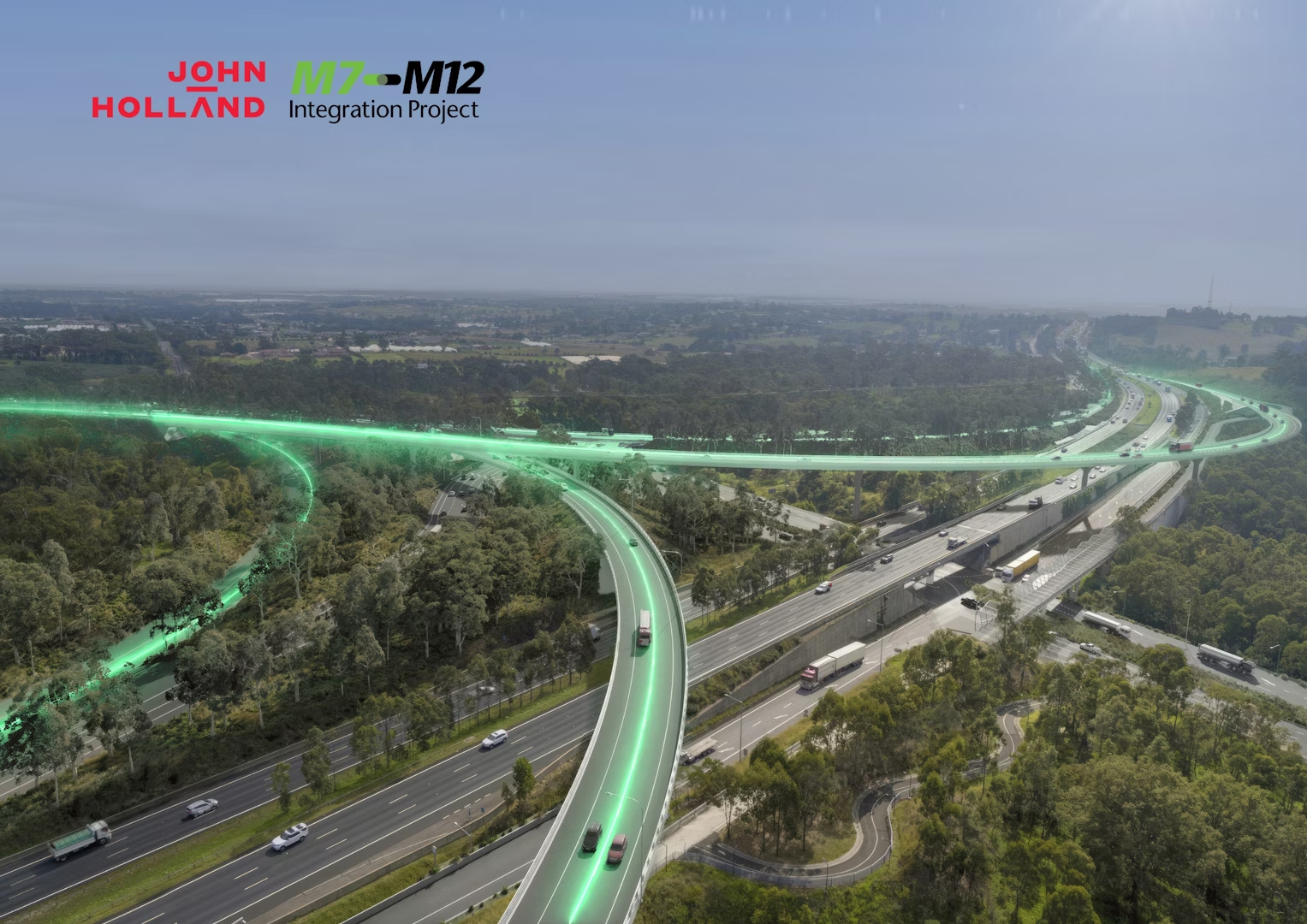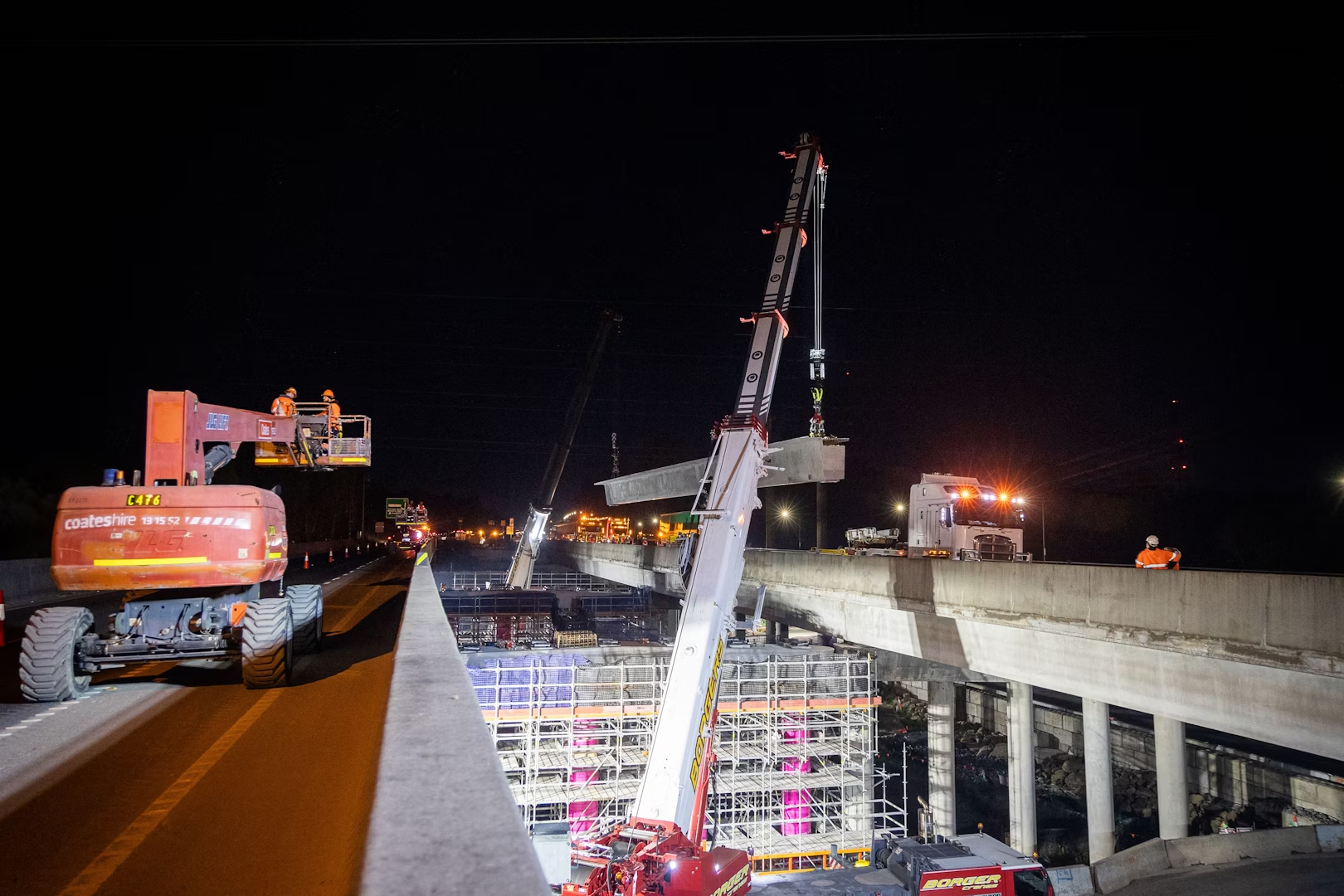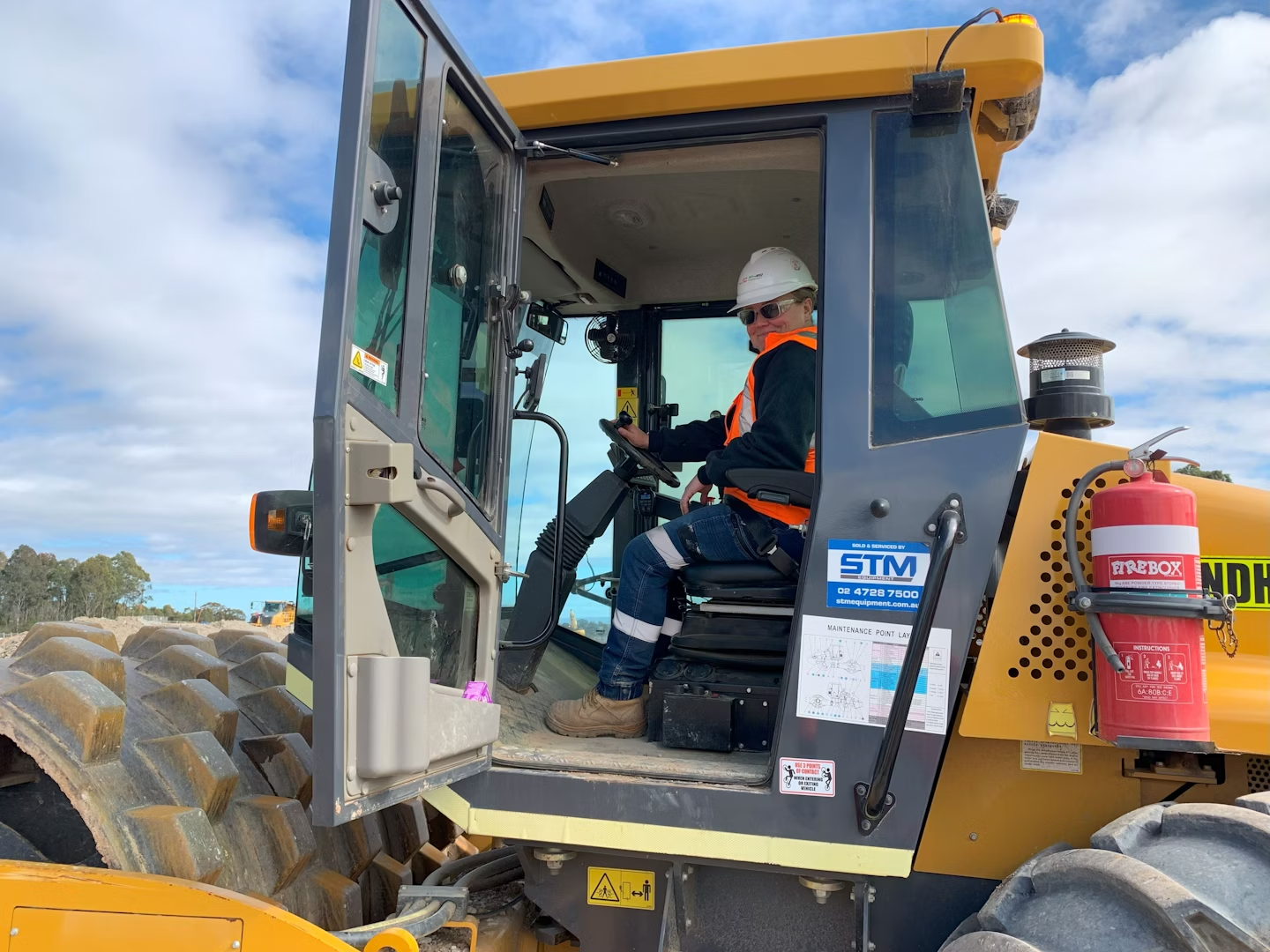M7-M12 Integration project – The Late-Start program – Social Outcomes
The Late-Start program at John Holland’s M7-M12 Integration project is revolutionising the construction industry by redefining working hours and offering greater flexibility to all. Supported by the NSW government, this groundbreaking initiative introduces a second rostered pre-start of 8:45am – complementing the standard 6.45am session – meaning women, other parents and carers, and those with varying morning commitments can now pursue a career in construction.
Unlike the vast majority of similar pre-employment initiatives, the Late-Start program is both paid and provides job security from day one, with participants offered an apprenticeship at John Holland as soon as their training commences.
This unique program not only helps to diversify the construction industry’s workforce, which currently comprises just 15% women, it also helps to address the sector’s skills shortage by promoting construction as a flexible and accommodating employer of choice.
Describe WHAT you have done and HOW you have done it. Please provide a summary of your initiative, innovation, or approach.
The Late-Start program is a circuit-breaker in the construction industry, dismantling the assumption that 6.45am is the required start time for all workers.
Supported by the state government’s Women in Construction Industry Innovation Program and successfully trialled at John Holland’s M7-M12 Integration project, the Late-Start program offers construction workers an alternate pre-start meeting at 8.45am, meaning those who can’t commit to the early start can still pursue a career in construction. This has the potential to not only attract a more diverse workforce, it also promotes the sector as flexible and inclusive, helping to address the industry’s skills shortage.
The Late-Start program centres around the establishment of a second pre-start. Without attending a pre-start – which communicates key tasks and safety updates – workers aren’t allowed on-site. But the traditional 6:45am pre-start is a barrier for workers with young children or other morning commitments. In fact, a difficulty balancing work with other responsibilities is the main reason why women consider leaving construction. The Late-Start program’s 8:45am pre-start means women, other parents or carers, and those who feel a later start is better for their wellbeing, can now pursue a future in construction.
Unlike many other pre-employment training initiatives, the Late-Start program is paid and provides permanent employment with John Holland, with participants commencing an apprenticeship at the conclusion of the four-week program. this delivers both financial and job security.
Trailed on the M7-M12 Integration Project, a mega- project based in Western Sydney which boasts a workforce of 250 full-time employees, 100 wages staff and over 500 people on-site daily, the first step in executing the Late-Start program was targeting Western Sydney women looking for a new career. With a recruitment campaign comprising of social media, local area marketing and media coverage, in less than a week it reached 84,000 women, generated 197,000 impressions and attracted 400 applications.
Secondly, an information session was hosted which included a team building activity and an outline of what applicants could expect. A shortlist was then created, and members of the project’s People and Construction teams conducted interviews to determine the final 11 participants.
A large emphasis was placed on ensuring the buy-in of the project’s frontline construction team, including superintendents and supervisors. Their support was critical to the program’s success, as they’d be working closely with the cohort and would have the greatest impact on their experiences on-site. Superintendents were given significant influence throughout the selection and training process, oversaw the participants’ integration on-site and had regular check-ins to ensure their experiences were positive.
Throughout the program’s delivery, extensive workforce consultation was also undertaken. For example, many frontline leaders had never managed a team of women with little construction experience. These leaders needed a safe space to voice concerns, in which training was provided on appropriate workplace behaviour, delivering constructive feedback and building an inclusive culture. There were also formal bi-annual check-ins with both the supers and the participants, to uncover what was working well, what wasn’t, and any additional training required.
What were the OUTCOMES and how were those outcomes shared?
The Late-Start program has delivered valuable outcomes for the participants, the M7-M12 Integration project, and the industry more broadly.
- Removing barriers of entry
The Late-Start program’s successful implementation demonstrates that construction, with an 8:45am start time, can offer greater opportunities for parents, carers, individuals with long commutes, and those who prioritise morning health and wellbeing routines. For these groups, a career in construction is now a genuine opportunity, when previously this may not have been the case.
Women in particular, who represent just 15 percent of the industry, are given greater access to employment opportunities, with the Late-Start addressing findings that a lack of exposure to construction-related activities, hours of work and inadequate marketing of roles to girls and women are the most significant barriers to entry.
Leaders in the industry agree that the program will have ongoing benefits for both the industry and the workforce, with a recent survey of the project’s supervision team finding that 90% believe the Late-Start program reduces barriers for women entering the sector. - Normalising flexible working arrangements
Traditionally associated with long, rigid hours, the Late-Start program is helping to rebrand the construction industry as a flexible and accommodating employer, allowing it to attract a more diverse talent pool. By introducing a second pre-start meeting, the program normalises flexible working arrangements, making them visible – and therefore accessible – to all. In the survey mentioned above, 80% of the supervision team said they believe the Late-Start program could be implemented across other projects, and they feel more equipped to accommodate flexible work initiatives. This highlights the program’s scalability and the positive impact it’s having on the entire workforce, with male workers now feeling more confidence to exercise adhoc flex options too. - Improving attraction and retention in non-traditional roles
An important outcome of the Late-Start program is that all 11 participants commenced apprenticeships with John Holland, contributing to the diversity of the project’s workforce, especially in non-traditional roles.
As mentioned above, a lack of marketing of construction roles to women is a key contributor to their underrepresentation in the sector. The media and industry attention garnered by the Late-Start program will address this, helping to attract women to the industry and amplifying the message that regardless of your circumstances, construction can offer you a promising career pathway.
As part of the program, the project’s supervision team underwent extensive training and consultation, ensuring they felt confident leading a cohort of women with no construction experience. It’s been a worthwhile investment, with 73% saying they’re now more likely to consider women for on-site roles.
How outcomes were shared
To ensure the positive impacts of the Late- Start program are felt across the industry, outcomes have been shared widely with internal and external stakeholders.
The M7-M12 Integration project is a recipient of the NSW government’s Women in Construction Industry Innovation Program (IIP) grant, which supports initiatives encouraging female participation and retention in the industry. The Late-Start program is one of these initiatives, and details of the program and its outcomes have been shared with the government and other IIP stakeholders, including the University of Melbourne, since its launch. This represents an opportunity for effective and impartial analysis of the program, and for its outcomes to be shared broadly in research papers and across the industry.
The initiative has also garnered attention from mainstream media including the Daily Telegraph, and industry bodies including the National Association of Women in Construction and Roads Australia, who have praised the program to their respective audiences, further amplifying its outcomes.
Additionally, to document the journey of the Late-Start participants, the project produced a Women in Construction video series, helping to celebrate the positive outcomes of the program. These videos provide firsthand perspectives from four participants, sharing valuable insights and program impacts. Additionally, the mini-series dispels biases for those with concerns about entering the industry. This will also play a key role in the recruitment for the Late-Start’s second iteration, launching later this year.
Following the program’s success, John Holland is continuing to lead in this space, and in tenders for new business, is using the Late-Start’s execution on M7-M12 Integration project as a case study for proposed new rostering systems.
Describe WHO benefited from your initiative, innovation, or approach?
The industry-first Late-Start program has delivered exceptional results for a number of stakeholders.
First and foremost, significant gains have been made by the construction sector overall. The Late-Start program serves as an example that flexible work practices are possible on construction sites, removing barriers for women entering the workforce. It provides the industry with a compelling case study to refer to when promoting itself as a modern-day workplace that offers pathways for everyone, regardless of their gender or personal circumstances.
Not only does the program address the gender gap in the industry, but it also helps to resolve the overall skills shortage. By promoting gender inclusivity, the industry can expand its talent pool and attract individuals who may not have traditionally considered a career in construction. This diversification brings in a wider range of skills, experiences and perspectives, fostering innovation and problem-solving capabilities. Additionally, offering flexibility in work arrangements can also help to retain existing workers, mitigating the impact of the skills shortage.
Additionally, the media attention surrounding the Late-Start will help to promote the construction industry as an employer of choice. If embraced by other companies in the sector, the program could dismantle the assumption that all workers need to start at 6:45am - something which has previously deterred certain groups from entering the sector. The program’s success has also been shared with key advocacy groups in the industry including the Australian Constructors Association, NAWIC and Roads Australia, who have shared details of the program with their respective audiences, amplifying its scalability.
Of course, the program has also benefited the participants themselves. It provided all 11 with a unique opportunity to enter the construction industry and to do so in a way that suits their personal lives. The participants have not only gained valuable paid training, but were also given job security from day one, via a guaranteed apprenticeship with John Holland.
Finally, the Late-Start program has had a positive impact on other project employees, particularly on-site workers. By offering a second structured pre-start meeting at 8:45am, the Late-Start program has demonstrated that all workers can exercise flexibility as part of their role. This has resulted in greater adhoc flexibility for both the direct and subcontractor workforce, who can utilise this second pre-start whenever they require it. This challenges the long-held perception that workplace flexibility is incompatible with construction work.
What LEGACY and UN SDG CONTRIBUTION was achieved?
The legacy
The Late-Start program is creating a legacy of inclusion, diversity and opportunity. With the ability to re-define working hours, the program could be a gamechanger for construction, which is under-resourced and struggling to attract a diverse workforce. By offering a later pre-start, the Late-Start demonstrates that construction, like many other industries, can offer flexibility to all workers, regardless of their personal circumstances.
The Late-Start program increases the diversity of the workforce while also broadening the mindsets and skillsets of its leaders. The fact that 73% of the program’s supervising team are now more likely to consider women for on-site roles demonstrates a positive shift in attitudes, and points to a recognition of the value that women bring to the industry.
One of the key benefits of the Late-Start program is its ability to attract a broader talent pool. By offering a second start time, the program appeals to individuals who may have previously been deterred from a career in construction, including parents, carers, or those with a long commute. Following the success of its first round, applications for the second iteration will be opening soon, and will target all genders. This will reinforce the notion that everyone can pursue a career in construction and – importantly – give parents and carers of all genders the opportunity to fulfil their responsibilities at home before coming to work. The program is therefore also creating a legacy of equality, where traditional gender roles are redundant.
This program has been shared within John Holland and with other industry stakeholders to amplify its impact, and to allow for the initiative to be replicated across other projects. It’s also been included in a number of John Holland tenders as an opportunity to embed flexible working into a project from its commencement.
UN SDG contributions
The Late-Start program contributes to the UN Sustainable Development Goal #5: Achieve gender equality and empower all women and girls. Specifically, the program aligns with Target 5.5, which aims to ensure women’s full and effective participation and equal opportunities for leadership.
As mentioned, the program enables improved gender diversity in construction, where currently women represent just 15% of the workforce. A 2024 survey conducted by the Building Commission NSW listed difficulties in balancing work with other responsibilities and long or inconvenient hours as key reasons why women consider leaving the industry. By providing a second pre-start meeting, the Late-Start is enhancing gender equality on-site and in homes. As a result of the program, the M7-M12 Integration project boasts 18% female representation, with 6% in non-traditional roles and 12% in trades and apprenticeships.
Furthermore, the Late-Start program contributes to Goal #8: Decent work and economic growth. Target 8.5 is particularly relevant, as it aims to achieve full and productive employment and decent work for all. This is exactly what the Late-Start program achieves, giving all workers equal access to training, mentorship and career progression. By increasing the proportion of women on-site, the program has a ripple effect; when young girls see women excelling in construction, they’re more likely to consider a career in the industry themselves.
Finally, Goal #10: Reduced inequalities within and among countries, specifically 10.3, which reads – “Ensure equal opportunity and reduce inequalities of outcome, including by eliminating discriminatory laws, policies and practices and promoting appropriate legislation, policies and action.”
By affording workers of all genders with flexibility initiatives, the Late-Start program is dismissing traditional gender roles and reducing inequality at home and at work. While the program’s first cohort primarily targeted women, the program’s second round will be open to all genders, promoting fair and equal allocation of domestic responsibilities.

